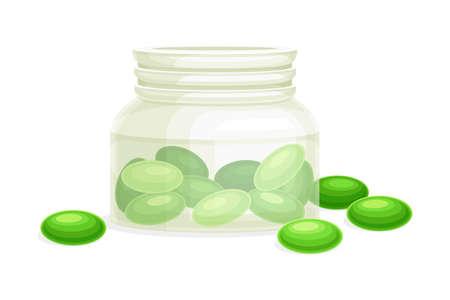Peppermint capsules are widely recognized for their benefits in easing digestive discomfort, especially symptoms related to irritable bowel syndrome (IBS). These supplements, derived from peppermint oil, offer natural relief through their antispasmodic and calming properties. However, while peppermint capsules can be helpful for many, they’re not suitable for everyone. Understanding who should avoid them is crucial to prevent unwanted side effects or health risks.
In this article, we’ll explore the medical warnings, interactions, and conditions that may make peppermint capsules unsafe for certain individuals.
What Are Peppermint Capsules?
Peppermint oil capsules are supplements that contain concentrated peppermint oil, typically enclosed in enteric-coated shells. The coating ensures the oil is released in the intestines rather than the stomach, where it could cause irritation. These capsules are primarily used to relieve bloating, gas, indigestion, and symptoms of IBS, thanks to the menthol in peppermint oil which relaxes the gastrointestinal muscles.
Despite their natural origin, peppermint oil capsules can have powerful effects on the body. Like all supplements, they must be used with caution, especially for individuals with specific medical conditions.
Medical Conditions That May Worsen with Peppermint Capsules
1. People with Gastroesophageal Reflux Disease (GERD)
Peppermint is known to relax the lower esophageal sphincter (LES), the muscle that prevents stomach acid from flowing back into the esophagus. For people with GERD or chronic acid reflux, this can worsen symptoms like heartburn, chest pain, or regurgitation.
While peppermint capsules are coated to bypass the stomach, some still experience increased reflux due to systemic effects of the oil. Individuals with GERD should avoid peppermint oil capsules unless advised otherwise by a healthcare provider.
2. Individuals with Gallbladder Issues
Peppermint oil may cause the gallbladder to contract, which can lead to pain or complications in people with gallstones or other gallbladder diseases. Those who have been diagnosed with gallstones or have had gallbladder surgery should consult a doctor before using peppermint capsules.
3. People with Hiatal Hernia
A hiatal hernia can contribute to acid reflux and may be worsened by anything that relaxes the LES. Since peppermint oil can reduce the tone of this muscle, taking peppermint capsules may increase reflux symptoms in individuals with this condition.
4. Children and Infants
Peppermint oil capsules are not recommended for children under the age of 12, and peppermint oil in any form should not be given to infants. It may cause breathing difficulties or lead to serious allergic reactions in young children.
Some over-the-counter digestive aids containing peppermint oil are marketed for children, but always speak with a pediatrician before use. Ingesting concentrated oil, even in capsule form, can be dangerous for younger individuals.
5. Pregnant or Breastfeeding Women
While peppermint tea is generally considered safe during pregnancy, the use of peppermint oil capsules during pregnancy or breastfeeding is not well studied. Peppermint oil may influence hormone levels or stimulate menstruation, potentially increasing the risk of miscarriage in high doses.
Moreover, essential oils can be passed into breast milk. Until more is known about the safety of peppermint capsules for pregnant or nursing women, they should be avoided unless recommended by a healthcare professional.
Drug Interactions with Peppermint Capsules
Peppermint oil capsules can interact with various medications. People taking any of the following drugs should exercise caution:
-
Cyclosporine: Peppermint oil may affect how the body metabolizes this immunosuppressant.
-
Antacids: These can break down the enteric coating of peppermint capsules too early, releasing the oil in the stomach instead of the intestines, leading to irritation or heartburn.
-
Blood pressure medications: Peppermint may enhance the effect of these drugs, potentially lowering blood pressure too much.
-
Diabetes medications: There is limited evidence suggesting peppermint oil may influence blood sugar levels.
It’s important to discuss all supplements, including peppermint capsules, with your healthcare provider if you’re taking prescription medications.
Signs You Should Stop Taking Peppermint Oil Capsules
If you experience any of the following side effects, discontinue use and consult a healthcare professional:
-
Heartburn or worsening reflux
-
Allergic reactions (rash, itching, swelling, difficulty breathing)
-
Mouth ulcers or a burning sensation
-
Nausea or vomiting
-
Rectal burning or discomfort
These symptoms may indicate an adverse reaction or inappropriate dosage, particularly in sensitive individuals.
Safer Alternatives to Peppermint Capsules
If you’re in a group that should avoid peppermint oil capsules, consider alternative ways to support digestive health:
-
Ginger capsules or tea: A milder, natural option that aids in digestion without relaxing the LES.
-
Chamomile: Known for its soothing effect on the stomach and intestines.
-
Probiotics: These help maintain gut health and can improve symptoms of IBS and indigestion.
-
Low-FODMAP diet: A dietary approach shown to reduce symptoms of IBS and other digestive issues.
Final Thoughts: Use with Caution
Although peppermint capsules are effective for many people dealing with digestive problems, they are not universally safe. Individuals with GERD, gallbladder issues, children, pregnant or breastfeeding women, and those on certain medications should avoid or use these supplements only under medical supervision.
Always read labels carefully, and don't assume that natural means harmless. Speak to a healthcare provider before starting any new supplement, including peppermint oil capsules, to ensure it's the right fit for your individual health needs.



